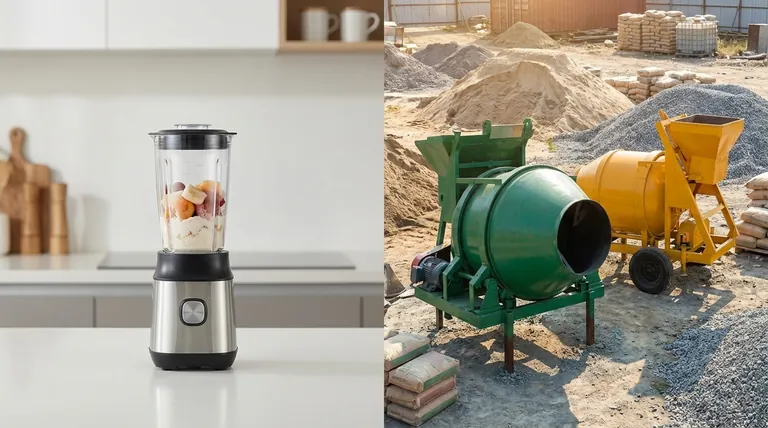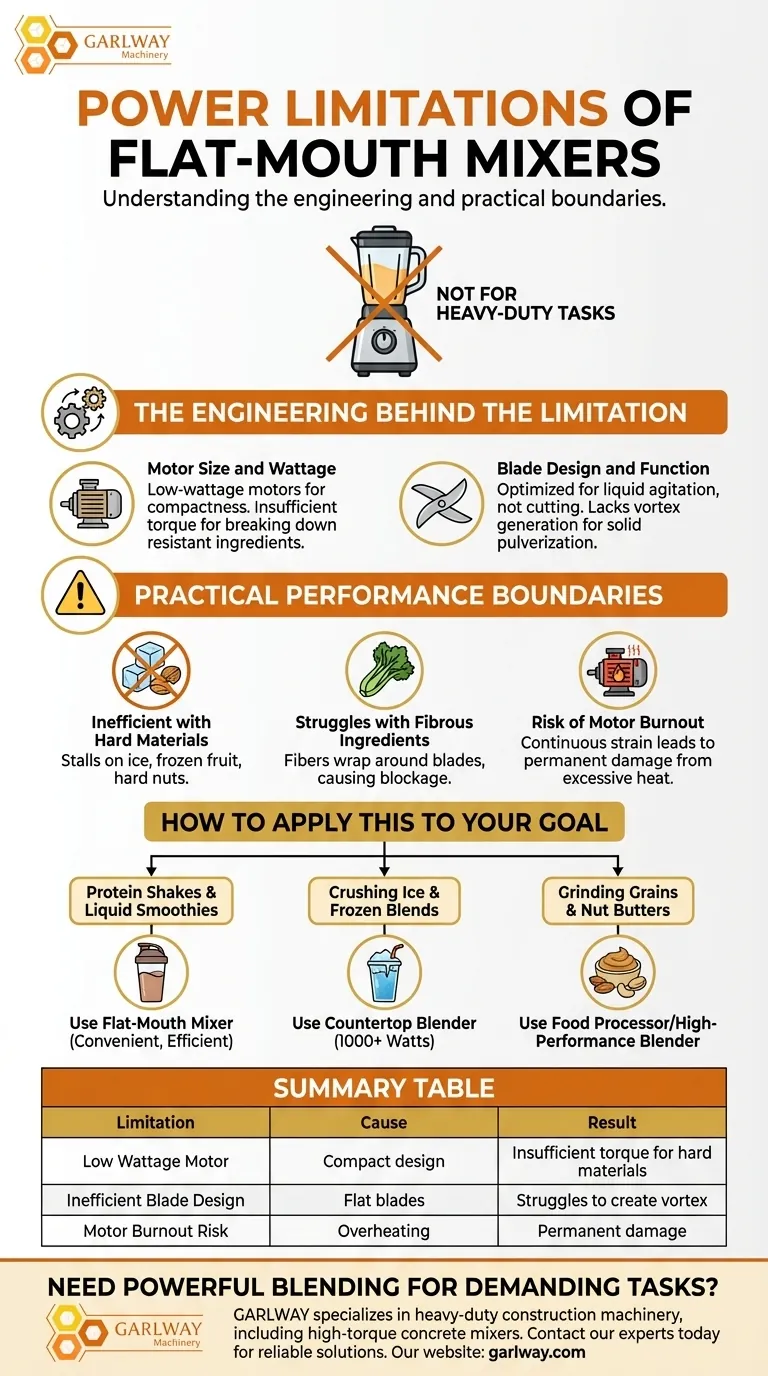The primary power limitation of flat-mouth mixers is their relatively low wattage, which makes them unsuitable for processing hard, dense, or highly fibrous materials. They are purpose-built for convenience with soft ingredients, not for high-torque, heavy-duty blending tasks.
The core issue is a matter of design intent. Flat-mouth or personal-style mixers prioritize portability and simplicity for liquids and powders, intentionally trading the high-power motors and robust blade systems required to effectively pulverize materials like ice, frozen fruit, or dense vegetables.

The Engineering Behind the Limitation
The power constraints of these mixers are not a flaw but a direct result of their design philosophy, which emphasizes a small footprint and ease of use for specific applications.
Motor Size and Wattage
A mixer's power is fundamentally tied to its motor. To maintain a compact and lightweight profile, flat-mouth mixers use smaller, lower-wattage motors.
This design choice directly limits the amount of torque the blades can generate, which is the rotational force needed to break down resistant ingredients.
Blade Design and Function
The typical flat blade assembly is optimized for agitating liquids and dissolving powders. It excels at creating a smooth consistency from already soft components.
However, this design lacks the aggressive angles and sharp, multi-pronged structure of traditional blender blades, which are engineered to create a vortex. This vortex is crucial for pulling solid items down and repeatedly forcing them into the cutting path.
Intended Use Case
These devices are engineered almost exclusively for soft foods and liquids. Their power level is perfectly sufficient for mixing protein powders, yogurts, fresh berries, bananas, and other soft fruits into a liquid base.
Practical Performance Boundaries
Understanding what these mixers cannot do is critical to avoiding frustration and potential damage to the appliance. Pushing the device beyond its intended limits will lead to poor results and can cause permanent motor failure.
Ineffective with Hard Materials
The most common point of failure is attempting to blend hard items. Ice cubes, large chunks of frozen fruit, hard nuts, or raw carrots will often stall the motor or be left in large, unprocessed pieces.
Struggles with Fibrous Ingredients
Dense, fibrous vegetables like kale, celery, or ginger can be problematic. The low-torque motor may not have the power to sever these fibers cleanly, often resulting in them wrapping around the blade assembly and stopping its rotation.
Risk of Motor Burnout
Continuously running the mixer while it struggles with tough ingredients generates excessive heat in the motor windings. This can quickly lead to overheating and permanent damage, a condition known as motor burnout.
How to Apply This to Your Goal
Your choice of appliance should be dictated entirely by the ingredients you plan to use most often.
- If your primary focus is post-workout protein shakes or simple liquid-based smoothies: A flat-mouth mixer is an excellent, convenient, and efficient tool for the job.
- If your primary focus is crushing ice for drinks, blending frozen fruits, or making green smoothies with fibrous vegetables: You must use a traditional countertop blender with a higher-wattage motor (typically 1000 watts or more).
- If your primary focus is grinding grains, making nut butters, or processing dense food pastes: A dedicated food processor or a high-performance blender is the necessary equipment for these demanding tasks.
Matching the tool to the task is the fundamental principle for achieving the results you want without damaging your equipment.
Summary Table:
| Limitation | Cause | Result |
|---|---|---|
| Low Wattage Motor | Compact, lightweight design | Insufficient torque for hard materials |
| Inefficient Blade Design | Flat blades for agitation, not cutting | Struggles to create a vortex for blending solids |
| Motor Burnout Risk | Overheating from straining on tough items | Permanent damage from pushing beyond design limits |
Need powerful, reliable blending for demanding construction site tasks? GARLWAY specializes in heavy-duty construction machinery, including high-torque concrete mixers and batching plants built for tough materials and continuous operation. If your projects require equipment that won't stall under pressure, contact our experts today to find the right solution for your needs.
Visual Guide

Related Products
- JZC400 Mobile Small Concrete Mixer Cement Mixer Machine
- Portable Cement Mixer with Lift Concrete Machine
- Commercial Electric Concrete Mixer Machine HZS 50 Small Batch Plant for Sale
- JW1000 Mobile Cement Mixer Concrete Mixer Truck and Batching Plant
- JZC500 Large Cement Mixer Machine Price for Concrete Mix
People Also Ask
- What is a mobile mixer? The Ultimate Guide to On-Site Concrete Production
- What makes towable cement mixers suitable for certain projects? Unlock On-Site Efficiency & Mobility
- What are the main advantages of a mobile concrete mixer? Gain On-Site Control & Cost Savings
- What is the capacity of a small concrete mixer? Choose the Right Size for Your Project
- How does a mobile concrete mixer improve efficiency? Gain On-Demand Concrete Control



















